Features
Up Close With Candlebox’s Kevin Martin
It’s been 26 years since Candlebox emerged out of the then-exploding Seattle music scene and 23 years since the band’s self-titled first album was released on Maverick. Since then, Candlebox has weathered personnel changes, a six-year hiatus, and Napster to rock just as hard as it did during those early days in the Pacific Northwest.
Disappearing In Airports drops April 22 through Pavement Entertainment and will be distributed by MRI/Sony Red. Preordering it via iTunes gives you two instant grat-tracks – “Vexatious” and “Supernova.”
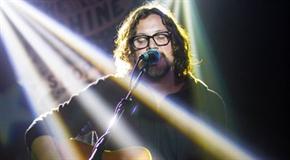
What can you tell us about Disappearing In Airports?
It’s quite a departure for us. It’s a lot more, I guess, streamlined. It’s very cohesive. It has a sense of urgency to it. We tried to limit ourselves when we went into the studio with this one, to really force the creative nature. We didn’t overthink songs. We really wanted them to just come to us. We had five things written for the studio, we had another four ideas, then we wrote three in the studio. We did the record – 12 songs – in four days, drums and bass, two days for guitars and vocals … It was pretty quick.
Out of that we got a really invigorated album, something that’s kind of relentless, once it starts it never stops. There’s politics in there, there’s love in there, there’s sex, drugs and rock ’n’ roll. It’s all in there. But it’s very cohesive. I don’t know how we were able to pull this off. I think maybe it was because we limited ourselves to how we worked it. I didn’t do vocals when we were tracking the songs. I only had, I think, three songs lyrically written. It was really just, “How does it feel? How does it feel moving and can I fit the vocals and lyrics to move in this progression? And that’s how we did it. We really made sure the melody and lyrics came last. I normally have some semblance of what I’m going to do in the studio. I think it’s the best record we’ve ever made. There’s not a song on it that I skip. I dunno if that’s a good thing or not. I’ve read pros and cons about liking your own art that you create whether it’s good or not.
You didn’t describe it as a concept album. Does the album go right up to that line without crossing into concept territory?
I think we went right to the edge. There’s not an ultimate theme from beginning to end. … We didn’t limit ourselves to how we worked the songs. There wasn’t a fundamental rule that we followed. It was just “What do we want to do? That feels great. Let’s move there. … Let’s come up with something different.” It was really about the collaboration of the band more so than what we wanted the record to sound like. Conceiving anything for me, I can’t keep a thought longer than five minutes. To have to sit down and try and figure out how to conceptionalize an album from top to bottom under one main theme, I don’t think I’m ever going to be able to do that. I’m not cut from that cloth, I suppose.
A longtime description of a great rock album is that it will piss off a 15-year-old’s parents. Would you say that about this one?
Yeah. I’m gonna piss off a lot of 15-year-olds’ parents. I’ve got a song on here called “I’ve Got A Gun,” which is about these idiots who argue their Second Amendment right is being taken from them. It’s written from the perspective of that person. That’s how we went about it. … There’s several songs on the record that argue or skew that line of “Is this appropriate for a 15 year old,” if you will.
But I tend to always do that. I always have one or two songs on there that will upset somebody. Generally, it’s our fans. I’ve always come from the place where if you don’t like what I’m saying, don’t listen to it. It’s just my opinion. That’s all it is.
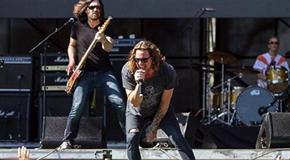
But isn’t art supposed to challenge people and the way they think, to push the envelope?
I think what upsets me most is when I get an email from a fan that says something like, “Keep the politics to the politicians. You’re a singer in a band.” I think there’s no better place than music for an opinion to be brought up, to be argued. It’s been that way since classical music. If you’re not pissing off the establishment or the people that listen to you, you’re not doing your job. That’s what music is supposed to do. It’s supposed to make them think, it’s supposed to [challenge them]. That’s why I’m like, “Just don’t listen to it. I don’t care. If you’re pissed off and don’t want to follow us anymore, then don’t. I don’t really give a shit.”
The tour begins in a few days and Disappearing In Airports arrives April 22. Are there advantages to starting the tour before the album comes out?
I argue that it’s not advantageous. But everyone on my team seems to believe that you still come from the day and age where you have to support a record before it comes out. … I think you gotta let the music sit for a minute in people’s bellies before they want to see it. But when you have a team of people saying, “We want to get out there. We want to promote it. We want to make this stuff happen because Best Buy is on board, and FYE, and all these other companies that are going to be supporting the record.” It’s hard to argue with them on that concept. You don’t want to fight the people who are supporting what it is, the art that you created. I would have much rather waited until May to kick things off. But we’ve released three songs so far. We’re releasing a fourth song, I think, on Friday, for the gratis people who preordered the record. So we’ll be going out with four songs at least. Hopefully they’re interested in them.
You mentioned that the recording sessions for Disappearing In Airports took about four days. How long did the band spend on your first Maverick release?
We wrote those songs for that first release over the course of a year. The demo versions of “You” and “Far Behind” that we tracked on Easter of ’92 are the actual versions that made the record. We had those songs. We had been playing them live so we really knew what we were doing when we got into the studio. It think we did that record in about two weeks for a total of $20,000, which, back then, was great. It was amazing. We did this record for $12,000 in 12 days.
It’s so much different now, because of Pro Tools and the opportunity where you don’t have to go in prepared, you don’t have to go in with everything written, that it makes it a lot easier. Back then you had to know what you were doing because tape cost a lot of money and you could only track over the two-inch five or six times. You really had to capture what you needed to capture at that moment. Now it’s, “I like that part. Let’s loop that” and all that sort of thing. The art is gone, unfortunately, but it’s still a creative process.
You’ve said the track “Vexations” is about “The social networking obsessed, unlimited bragging rights society we live and where people come off as entitled yet so insecure … “ How do you cope in this social media / self-obsessed world?
It’s a hard place. Like I said, the instant email [saying], “I hate the fact that you’re political.” It’s weird. Candlebox was always this faceless rock band from Seattle. I liked that. Now our face is everywhere and people are posting pictures on a daily basis. It’s a necessary evil. I’d rather much not be so glued to it. But it’s what keeps us going. It’s a new way of marketing. Radio is only 10 percent of your audience now where it used to be 50-60 percent. You gotta find those ways to reach an audience that posts something that says, “Hey! Whatever happened to Candlebox? Are they still around?” And all you have to do is type “Candlebox” in a search engine.
But it seems that we’re becoming lazy as a society. … I feel bad that I’m feeding the smart phone that’s making us stupid. … I dunno. I like it and I don’t like it. I feel torn sometimes because I don’t want to respond to certain posts or I don’t want to respond to certain questions. Sometimes I feel like “You’re just an idiot because all you have to do is click the tour dates tab to find out when we’re coming to your town instead of emailing me.” But, again, people like that interaction so I have to play that game [and] as much as I dislike it, it’s part of where my career is now. In 25 years in this business I’ve seen it all. I’ve seen it come and go, and it’s just kind of the game you have to play, I suppose. You don’t really want to but you got to.
But do you ever find yourself on the other side of that equation, acting like the people you just described? Maybe responding to something you’ve read online with your own rant or screed?
Oh, yeah, I’m absolutely guilty of that, 100 percent. I’d be lying if I said no. I’m totally caught up in it sometimes.
What are tour rehearsals for Candlebox like?
We generally start off very easy and just kind of figure out the kind of set we want to work with. We’ll design three or four sets for the tour and out of those three or four, nightly, we’ll switch up, maybe, two or three of the songs. It’s really about organizing what we’re going to do for the first week. Then, in the process of touring, we’ll figure out what’s not working, what’s working. Rehearsals are really just re-acclimating ourselves to that hour and a half to two-hour set that we play. Those old songs we haven’t played in three or four years. There are a few songs in the set we haven’t played in almost 15 years. So that’s going to be interesting to figure out whether they work or not.
We also spend a lot of time reworking some of the old songs to give them a new energy or new vibe. Our rehearsals are about eight to 10 hours a day. But most of that is spent discussing things. Maybe four or five hours are spent actually running the set or rehearsing the songs.
You’ve done acoustic shows as well. Did you learn anything new about those songs once you stripped them down to melody and lyrics?
Oh, yeah. Songs like “Drown” on the Lucy record is not one of my favorite songs but acoustically I love playing it. That was one of the songs that we had to rework. There are elements of it that just don’t work acoustically. So we had to restructure that, we had to figure out a different chord progression to use, a different way to give it energy that was maybe lacking acoustically.
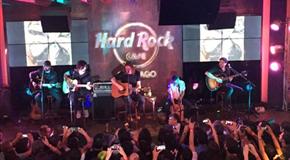
“Used” is another one that we had to rework. We approached that from more of a Richie Havens kind of a concept. I’ve always been a big fan of that song “Freedom” from Woodstock ’69 and how relentless he was in playing that song … it’s urgency in its entirety from start to finish. And I wanted that song, “You,” to feel that way. It took me a good week to figure that out. It’s a fun thing, though. It’s so nice to revisit things and to play them differently for an audience that is so used to the version they’ve been hearing for 20-plus years and tell the stories behind the songs. That’s a real treat for me.
Four years after Candlebox formed you and the band were on Metallica’s 1994 tour. Was that a surreal moment?
It was mindblowing. I don’t think we really ever expected the band to get to a point where we’d be touring with Rush that spring of 1994. That, in itself, was one of the greatest gifts we had ever been given as a band. Then, to be able to do the Metallica tour, to be asked by the guys to … fill in for Alice In Chains, to spend time with them and to drink it all in as to what real rock ’n’ roll bands are like. We were so kind of green when it came to being on the road and playing in front of 30,000 people, that we had to learn how to do that. We had to learn how to approach the songs and how to put the setlist together. That was something we learned from those guys. To think we would ever have been touring with Metallica when I was 12 years old when Ride The Lightning came out … I would told you you were crazy. … To this day I look at this poster I have hanging on my wall from that tour and I’m like, “What a career I’ve had and how lucky I am to be able to do this.”
Have you kept that in mind when selecting your own opening acts?
Absolutely. We pick bands that we like. We pick bands that we can, maybe, nurture a little bit and give them the dos and don’ts. “Pay attention to this and let that go,” sort of things. … We were given that opportunity with Rush and Metallica. Both bands were very gracious with their time and [gave us] information about our careers, things we should pay attention to and watch out for. It’s nice to be able to give that back.
What do you think is the public perception of Candlebox today versus when the band’s first albums came out?
I dunno, man. I’m sure there’s the question, “Why are these guys still doing this?” And then there’s the perception that “they’re better than they ever were.”
We’ve grown a lot as a band and we’ve grown a lot as musicians. I was just in Florida the other night playing a show with Everclear and Sister Hazel, a nice festival thing. A buddy I’ve known since we first started touring … I would have been about 23 when I met him and we’ve been best friends ever since, he said, “I don’t know what’s going on, but you guys are better than I’ve seen.” And I don’t know how that is possible because he saw us with Metallica, with The Flaming Lips and on all our own stuff. [He said], “And those don’t even compare with what you’re doing now, what you’re accomplishing as musicians with the show in an hour and a half to two-hour sets.” … I hope the perception is these guys are better than they ever were. I don’t really know. I think I probably should try to pay attention to that a little more. I just think people love what we do and they’ve loved us for so long that they’re glad we’re still here, that we still make the music that they love. We haven’t really changed that much over the years. We’ve gotten a little bit different and a little more creative in our songwriting and not so meandering and noodling sort of shit. I think they’re happy we’re still around and they can still can catch that moment of history that they love so much, that period of the ’90s where the music was really honest and sincere.
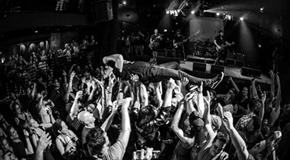
Being in one of the Seattle bands during an era and location that has so much history, was that a great time to be alive?
Oh, yeah. I moved [to Seattle] when I was 14 years old in 1984. I went to see Soundgarden play. They were a three-piece. Chris Cornell was playing drums. I was absolutely floored. To be able to grow with that musical community and experience so many shows that people talk about all the time was amazing. I pinch myself every day that I have had the opportunities that I’ve had and the career that I’ve had that has been given to me by an audience of people I barely know. I think that has a lot to do with being from Seattle and being in the right place at the right time in a city where every eye in the world was on. Obviously, it takes a little luck. But I think we had music that was different than what was coming out of Seattle.
The nice thing about Seattle bands was that they were all different. There’s not one style of music that came out of there. Of course, they gave it the name “grunge” but Soundgarden is a progressive rock band, Alice In Chains is a metal band, Nirvana was a pop-punk band, Pearl Jam is an arena rock band. Screaming Trees was one of the most independent rock ’n’ roll bands I’d ever seen. The list goes on and on. I think what is so amazing about that city is it had that New York quality to it where you never knew what you were going to get at a show you went to see. There were those Ramones bands and there were those Talking Heads bands and those kind of really eclectic, cool things happening, they just happened to be a little bit heavier, a little bit faster or a little bit slower. And a lot louder, that’s for sure.
Do you still see that today?
I dunno. I think there’s great music out there. I think there’s a lot of really talented bands. Are they coming from one city? I don’t think so. I think they’re just coming from an entire country rather than just from London or just from Manchester, Seattle, Chicago or whatnot. It’s just so different now. There’s so many different types of [music] out there. There’s so much inspiration to draw from because the world has grown so rapidly. Even since 1990, everything has changed, digitally, the internet and stuff, there’s just so much more. Is there ever going to be a community like Seattle again? I don’t think so. I honestly don’t. I think there’s just too much opportunity. Maybe Vegas because of what’s going on with Imagine Dragons and The Killers and what they’ve accomplished as bands over the past few years, drawing attention to that city. Most of those guys from Vegas, they were all in cover bands so they kind of know how to write a song. Whereas I was never in a cover band. I don’t think any of the guys in Soundgarden, Alice In Chains, or Pearl Jam, any of those cats, were either. It was always about writing our own music and being our own bosses rather than trying to learn a bunch of other bands’ shit to make $250 a night. I get asked to do cover songs of bands all the time and I’m like, “I don’t know that song. You’ll have to get me the lyrics.”
It’s an interesting thing. Communities are always surprising and maybe there’s a city out there that’s going to develop six or seven bands. I know Atlanta had a scene for a while, obviously with the hip hop community.
Detroit is another city. I wrote a song on this record called “Spotlights,” which is about those icons, those prophets that came from this city that’s been dying for the past 30 years and how much that has influenced me and how much inspiration I find in the beauty and the destruction of Detroit.
You’ve mentioned politics, social media, the condition of the world and such. What would you do if you ruled the world?
I’d probably get Bernie Sanders’ handbook about how to make things right. I think that guy is on to something right now. He’s been talking about it for 30 years. I would rule with great compassion. I’m very empathetic to what’s going on in the world. I’m very empathetic to the plight of a society that is running out of money. Kids that can’t eat, families where both parents have to work because they can’t afford to live. I would be very compassionate, I think. I would try to get the rest of the world to be just as compassionate.
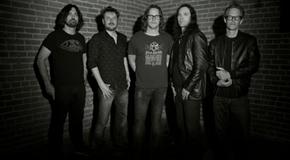
Upcoming Candlebox gigs:
April 7 – Houston, Texas, Scout Bar
April 8 – San Antonio, Texas, Fitzgerald’s Bar and Live Music
April 9 – Tyler, Texas, Click’s
April 10 – Lubbock, Texas, Jake’s Sports Cafe & Backroom
April 12 – El Paso, Texas, Speaking Rock Entertainment Center
April 13 – Tucson, Ariz., Rialto Theatre
April 15 – San Luis Obispo, Calif., Fremont Theatre
April 16 – San Francisco, Calif., Slim’s
April 19 – Butte, Mont., Butte Depot
April 20 – Billings, Mont., The Pub Station
April 22 – Denver, Colo., Marquis Theater
April 23 – Pueblo, Colo., Memorial Hall
April 26 – Little Rock, Ark., Clear Channel Metroplex Event Center
April 27 – Monroe, La., Live Oaks Bar & Ballroom
April 28 – Baton Rouge, La., Varsity Theatre
April 29 – Panama City, Fla., Club La Vela / Gulfside Amphitheatre
April 30 – Jacksonville, Fla., Metropolitan Park (Welcome To Rockville)
May 3 – Annapolis, Md., Rams Head On Stage
May 5 – Nashville, Tenn., 12th & Porter
May 6 – Concord, N.C., Charlotte Motor Speedway (Carolina Rebellion)
May 7 – Marietta, Ohio, The Adelphia Music Hall
May 19 – Bethlehem, Pa., Sands Bethlehem Event Center
May 21 – Warrendale, Pa., Jergels Rhythm Grille
May 28 – Uncasville, Conn., Wolf Den
June 12 – South Bend, Ind., St. Joseph County Fairgrounds (103.9 The Big Growl)
Aug. 6 – Hot Springs, Ark., Timberwood Amphitheater
For more information, please visit Candlebox’s website, Facebook page, Twitter feed, YouTube channel, SoundCloud home and Instagram account.